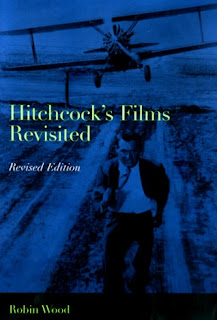"Hitchcock's Films Revisited", Robin Wood
Robin Wood
(1931-2009) was a critic and founder of the film magazine CineAction,
a journal also dedicated to a radical political agenda of socialism, feminism,
Marxism, and gay rights. Author of several monographs around filmmakers such as
Hitchcock or Ingmar Bergman, his literary work emphasizes the consistent and
individual vision that each director puts on his films. His critical career
began with the publication of the article Psychanalyse de «Psycho» for Cahiers
du Cinéma. His texts show an authorial approach similar to that of the
French film magazine, but later on, they focused on semiotic and
poststructuralist theories.
Hitchcock’s Films was one of the first books (and the first
full-length study in English) on filmmaker Alfred Hitchcock. Originally published
in the 60s, under the influence of auteurist criticism, Wood later returned to
it in the 80s to make Hitchcock’s Films
Revisited, with new essays that reflected his development as a film critic influenced
by Marxism and feminism, while revisiting and commenting his original texts,
using also his personal experiences as well as his considerations on patriarchal
/ capitalist values that are present in classic Hollywood films. The considerations
on sexuality, morality and psychoanalytical theories in Hitchcock’s oeuvre, discussing
also its cinematographic aspects (mise en
scène, editing…), makes this book, possibly, still the most important critical
study on the master, providing intelligent and passionate answers for that
unforgettable question that starts its introduction: “Why should we take
Hitchcock seriously?”
Excerpts:
“[On Vertigo] The film ends with the
magnigicent image of Scottie looking down from a great height to where Judy has
fallen: magnificent, because it so perfectly crystallizes our complexity of
response. Scottie is cured; yet his cure has destroyed at a blow both the
reality and the illusion of Judy/Madeleine, has made the illusion of Madeleine’s death real. He is cured, but empty,
desolate. Triumph and tragedy are indistinguishably fused.”
“[On Psycho] Much of the film’s significance
is summed up in a single visual metaphor, making use again of eyes, occurring
at the film’s focal point (the murder of Marion): the astonishing cut from the
close-up of the water and blood spiralling
down the drain, to the close-up of the eye of the dead girl, with the
camera spiralling outward from it. It
is as if we have emerged from the depths behind
the eye, the round hole of the drain leading down into an apparently bottomless
darkness, the potentialities for horror that lie in the depths of us all, and which
have their source in sex, which the remainder of the film is devoted to
sounding.”
“[On Marnie] Now, Hitchcock is not Preminger:
he doesn’t want merely to show us a
woman caught in this condition, he wants to convey to us the feeling of the
condition itself – wants us to experience it directly as Marnie experiences it,
as far as that is possible. What better, simpler, more beautifully economical
and direct way than by these red flashes that suffuse the whole screen, filling
us, too, with a feeling of panic (we know no more than Marnie what they mean),
conveying this sense of being plunged abruptly, arbitrarily, into unreality?
“It is
symptomatic that the most obvious legacy of Hitchcock’s Jesuit education should
be the lingering fascination with Hell and damnation, often concretized in the
detail of the films. When Uncle Charlie arrives in Santa Rosa (Shadow of a Doubt), the whole image is
darkened by the black smoke from the train, and the character is thereafter repeatedly
shown with smoke hanging around him from his cigarette; when Bruno pursues
Miriam through the Tunnel of Lover (Strangers
on a Train) his boat is named Pluto; when Marion Crane tells Norman Bates
that she “thought she must have gotten off the right road,” he replies that “Nobody
ever comes here unless they’ve done that.” It is to these “damned” characters (ambiguously
lost souls or devils) that Hitchcock’s strongest interest gravitates, giving us
some of the most vividly realized performances in his films; one looks in vain
for any compensating intimation of Heaven.”
Link to the complete book on PDF:
https://mega.nz/#!Yb4zAS7L!8iT779ptnykCqgCVRi9RckaeMVAHilZsyhFb7ia0ZfA




Comments
Post a Comment